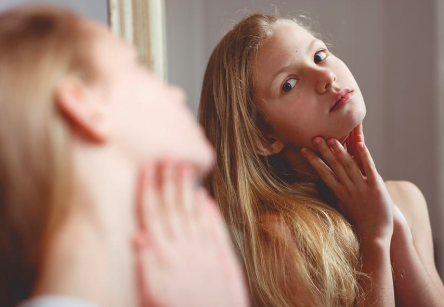Struggling with Body Image

Children are becoming aware of their physical appearance from a much earlier age. This is likely to be caused by the number of images that they are bombarded with these days and how those images have been used to represent a sense of beauty, wealth, or achievement. Most parents anticipate that a teenager – when hitting puberty – is likely to experience some emotional discomfort around their appearance. As their body grows in new ways they perhaps experience changes in their skin, leading to unwanted pimples and acne, or their body may develop at a faster or slower rate than that of their peers.
The sad truth, however, is that these sorts of situations are occurring in much younger children too.
More and more I am meeting families with children, who from as young as seven, are growing anxious about their physical appearance – be that their weight, their shape, or other physical attributes. In my experience, what I find to be helpful in these kinds of instances is to help your child develop a richer appreciation for what it is to be a good person. Taking the time to proactively point out and discuss positive personality traits that the person possesses can help them to see beyond what they see with their eyes. It can begin to shape and encourage their thinking to have more appreciation for the qualities that individual personalities have, rather than appearances.
It’s important too, to remember that children learn from modelling. Modelling is the process of observing someone else and replicating the skills that they have in yourself, and children do this unconsciously. They don’t necessarily seek to copy what they see and hear from those they are interacting with. And whilst it might be easy to initially jump to their peer group and wonder how they’re being influenced by others, we also need to look at ourselves as parents. If you have ever passed a comment about someone else’s appearance in front of your child, they will have absorbed that information and perhaps even created criteria in their mind, that they now use to judge others. If you have ever shamed your own body in front of your child, you will have developed criteria in their mind about how they should be judging themselves.
If you want your child to focus less on the importance of their appearance (or the appearance of others), it’s important that you demonstrate the same thing. You will need to put more emphasis on discussing positive personality traits instead of, “oo doesn’t he/she look nice?”, “wow they’re so slim”, “I wish my body was as fit as he is”, etc. The best way to do this is to not overly correct your child if you notice that they are making comments that highlight appearance. Instead balance the comment out with something favourable about personality, intellect, ability, commitment, effort, and so on.
There is a saying that ‘what you persist, resists’, meaning that sometimes when we overly correct a problem it just gives more value to the problem and causes us to highlight it even more. Imagine if you had a spot on your chin and somebody said, “Don’t worry about that spot on your chin. That spot on your chin is the last thing I think about when I think about you. I just think about who you are as a person, rather than the SPOT ON YOUR CHIN”. You can imagine the amount of embarrassment and awkwardness you would be feeling as a result of them mentioning your chin so much. If they were to ignore the spot on your chin completely and talk about all of of the good qualities of your personality, you might even end up forgetting about the spot on your chin yourself. And this is kind of the same.
It’s important that if we want to correct a behaviour, we put more emphasis and effort into talking about what it is that we want, rather than what it is we want to avoid. However, we know too that issues around appearance can often have other effects on areas such as socialisation, confidence and self-worth, and your child may need some assistance in developing these. So if you feel that it would be beneficial to you and your child to get some extra support in this area, then please reach out to me for a free consultation session. You can book this in via the bookings page on my website or by contacting my office and making an appointment with my PA, Olivia. She can be contacted on 07985 203 274, where she can book you in for a session at my therapy practice in Crays Hill, Essex. I work with those throughout Essex, in the areas of Crays Hill, Billericay, Basildon, Wickford, Southend-on-sea, Chelmsford, Colchester and Brentwood.
By Gemma Bailey
Leave a comment
This site uses Akismet to reduce spam. Learn how your comment data is processed.

Leave a Reply